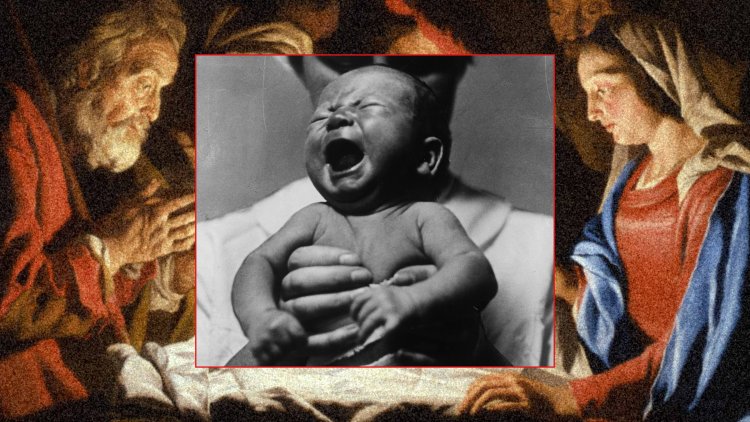What ‘Silent Night’ Misunderstands About Christmas
Depictions of a quiet, peaceful manger scene miss the point.

“Silent Night” is one of the most popular Christmas hymns, often sung in churches lit only by candles. The song describes a “tender and mild” infant Christ slumbering undisturbed in “heavenly peace.” Another beloved hymn, “Away in a Manger,” also focuses on the theme of divine serenity: It speaks of animals making noises but the child Christ being different. “The cattle are lowing,” goes one verse. “The baby awakes / But little Lord Jesus, no crying he makes.” Countless paintings hang in museums showing the manger scene as peaceful, with Mary gazing beatifically at her calm, still baby.
I bear no particular grudge against seekers of peace, nor do I desire to play the Scrooge around visions of Jesus that bring people joy. Nonetheless, I can’t help but notice that these depictions of Jesus’s first nights with his parents stand in stark contrast to most children’s early days.
“Silent Night” depictions of Christ’s birth are unrealistic, as plastic as decorations that appear on lawns every December, as staged as the declarations of love at the end of a Hallmark Christmas movie. And these versions of the Nativity miss something essential: the humanity of Jesus.
[Elizabeth Bruenig: Have yourself an early little Christmas]
Though neither of the Gospel accounts of Christ’s birth describes him crying, the Gospel of Luke says that Jesus “grew up,” which implies that he went through the typical stages of development. As an adult, he experienced a normal range of emotions: He wept at the death of a friend (John 11:35), experienced fatigue after a long day of travel (John 4:6), and was anguished at the thought of his impending crucifixion (Luke 22:44). The writer of the Letter to the Hebrews, looking back over the life of Jesus, says that he was “tempted in every way, just as we are—yet he did not sin” (Hebrews 4:15). Based on all this, as a scholar of the New Testament I feel confident that Jesus must have behaved like an ordinary baby.
And as a father, I know how babies behave. My wife and I have four children, and at some point during each birth, I feared for the safety of my wife, the child, or both. These infants’ first moments in the world were anything but serene. They cried and wailed; they peed and pooped. What brought on those tears? Were they cold? Hungry? In need of a new diaper or simply physical touch, to be held and comforted? We didn’t know. I imagine that Mary and Joseph felt a similar disorientation.
The Christmas story is about God becoming a child, but not in the sense that an infant had all the knowledge and power of God squeezed into a baby form. It’s not about divine shape-shifting. It’s about divine limitation, humility, and weakness. A crying, unsettled Jesus who soiled himself like any other baby captures the central miracle that Christmas proposes. For the Christian, God became one of the hungry, cold, dirty, and often-lonely people of the world. He is not detached from us; he is one of us. Once God joined our number, he infused us with fresh dignity. The Church can never rightly turn its attention away from the needy, be they infants or adults, because it worships a God who made himself needy.
Silence might not be the best way to describe that first Christmas, but there is something these hymns get correct. Jesus does not utter actual words. In a world weary of religious speech, Christmas is the celebration of an act. That act is the display of divine vulnerability taking on the complete helplessness of a child. God wraps himself not in strength and power, but in weakness. That idea that true power comes not through the exercise of it, but in setting it aside, seems as unbelievable in the 21st century as it did in the first. Stated differently, most Christians are not ready to take on the full implications of the Christmas story.
[David A. Graham: The war on Christmas is winning]
Today, many Americans—Christians very much included—believe that strength and power come from money or political influence or military might. That is why, the thinking goes, Christians must cozy up to the presidency and keep some fleeting favored status: to gain protection from the gathering dark. What good can a baby do against enemies foreign and domestic? Of what use is a manger to a Christian nationalist?
The Church has lost its connection to the tears of infants and the moans of adults. Christians are too often little more than another voting bloc caught up in the same struggle for national power as everyone else. Christmas reminds Christians like me that we should set aside our quest for earthly power and instead entrust our future to a God who joined his tears to ours, both in his nativity and later upon the cross.
Our lives and our world are not oceans of calm. There is weeping in Ukraine, Gaza, Sudan; at the border; in the city and the countryside. Maybe pondering a frightened Mary, a distressed Joseph, and a crying Jesus will allow us to set aside our own facades. If God was willing to put on weakness, that might free us to recognize our own.
What's Your Reaction?




















